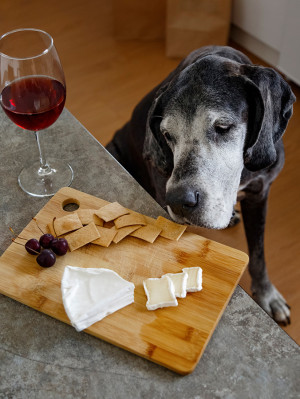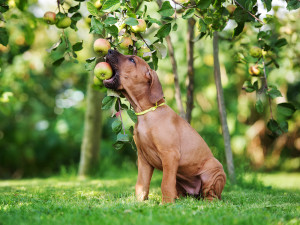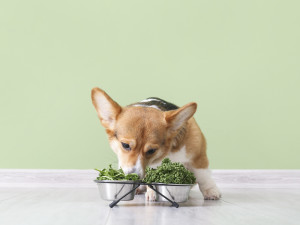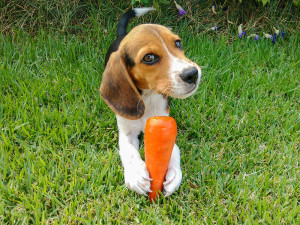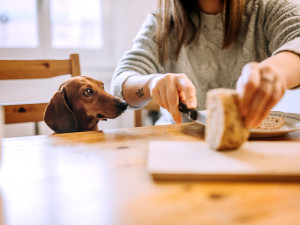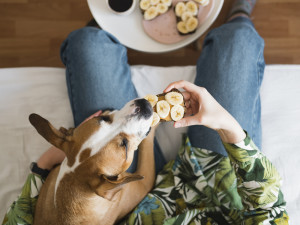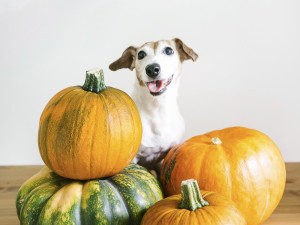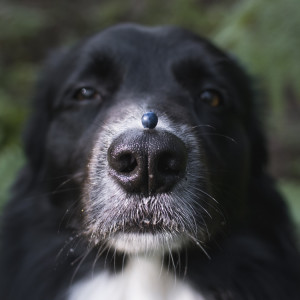Can Dogs Eat Butternut Squash?
Your winter farmers’ market is full of the stuff. Find out if your dog can have some.
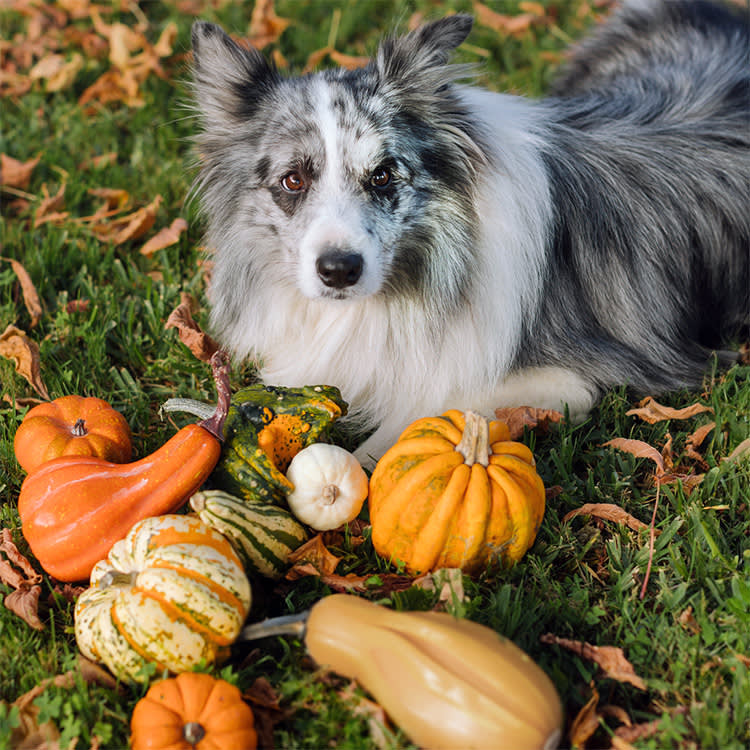
share article
Every year, the holiday season brings with it certain seasonal delicacies, like delicious butternut squash. So, can your pup eat this yummy winter veggie? Absolutely. In fact, butternut squash is not only safe for your dogs to eat; it’s also nutritious!
That said, certain spices that butternut squash is commonly prepared with can be a no-go for you pup. For more, we reached out to our veterinarian Dr. Amy Fox for answers to all our questions about sharing butternut squash with our pups.
Nutrition facts for butternut squash
Is butternut squash good for dogs?
Yes. “Small amounts of cooked butternut squash can provide healthy nutrients for dogs including fiber, vitamins and minerals,” Dr. Fox tells The Wildest.
Safe and nutritious, you can freely share some of this delicious veggie with your pup, but like with all non-toxic people food, there are still things you should know before giving it to your dog.
Can dogs have cooked butternut squash?
Yes. In fact, butternut squash is best given to pups when it is cooked, provided it’s been prepared without sauces, seasonings or high-fat oils.
Can dogs have raw butternut squash?
Raw butternut squash is non-toxic to dogs, so don’t worry if they snag a few pieces that fell on the floor. But they should really be enjoying the veggie in its softer, cooked form.
“Ideally, dogs should have cooked squash,” Dr. Fox explains. “The raw squash is more difficult to digest and can cause gas and digestive upset. It is also very tough and could be a choking hazard if a dog struggled to chew up and swallow a large piece.”
Can dogs have butternut squash seeds?
Butternut squash seeds are non-toxic to dogs but, according to Dr. Fox, they’re best saved for your garden. “Dogs should not eat the seeds, as they are very difficult to digest and could cause digestive upset,” Dr. Fox says. “They are not toxic but should be avoided if possible.”
Is butternut squash completely safe for dogs?
Completely plain butternut squash is entirely safe for your dog. The prepared butternut squash dish that is found on most holiday tables, however, might not be.
“If the squash is prepared with butter or other oils, lots of salt, or other seasonings, it may no longer be safe for your dog,” Dr. Fox cautions.
That being said, simply plan ahead and set aside some plain squash to share with your pup during the holidays. Also, make sure to prepare it in small quantities; this type of fibrous food can fill your pup up without giving them all the nutrients they need. Consider topping your dog’s regular, nutrient-balanced kibble with a few bites of the cooked veggie.
What are other dog safe foods you might find on your holiday table?
Carrots: Plain carrots are a healthy and nutritious snack opens in a new tabfor dogs. Because most carrots are served salted and seasoned, maybe slip your dog a plain one during your meal.
Cooked sweet potatoes: Sweet potato is considered a “superfood” for both humans and dogs, thanks to its digestive properties. Dogs should definitely enjoy this superfood as plainly as possible and in moderation. Like with carrots, if you plan to season your sweet potatoes, consider setting a plain one off to the side for your dog when cooking.
Apples: Apples are a sweet treatopens in a new tab your dog can enjoy safely, once the seeds and the core are removed. Similarly, avoid sharing apple pie with your dog. While cooked apples aren’t toxic to pups the sugar and fat in apple pie is likely to upset your dog’s stomach.
What are other non-dog safe foods you might find on your holiday table?
Garlic and onions: Though not usually served by themselves, garlic and onionsopens in a new tab are usually involved somewhere in the process of making food delicious. But garlic and onions are toxic to your dog, particularly onions. Avoid giving your dog any foods cooked or seasoned with garlic or onions.
Grapes and raisins: Raisins pose a very big risk to dogs. Even small traces of grapes or raisins can cause kidney failure in dogs. Avoid serving raisins and grapes in dishes that dogs can easily reach (such as a pre-dinner charcuterie boardopens in a new tab perched on a coffee table) and do not offer dogs foods that were cooked with raisins or grapes even if the raisins and grapes have been removed.
Pecans and walnuts: Common pie fillings, such as walnuts and pecans, are both very toxic to dogs. Both nuts contain juglone which can cause vomiting and GI distress. Unlike raisins and grapes, one or two dropped nuts are not likely to harm your dog, though you should monitor your pup after any amount of consumption. If your dog gets into a bag of nuts or a pie, though, make sure to get veterinary attention as soon as possible.
High-fat-content foods
Fatty foods, like buttery veggies or dark meat turkey can cause GI upset or even pancreatitis in your pup. Always make sure even “non-toxic” human foods are served plain without butter, seasoning, or tons of salt.
Bottom Line: Can dogs eat human food?
On its own, butternut squash is a nutritious, safe snack for dogs. If your dog has stomach sensitivities or dietary restrictions, make sure to speak with your vet before introducing any new foods to your pet.

Rebecca Caplan
Rebecca Caplan is a writer based in Brooklyn whose work has been featured in The New Yorker, Reductress, and Vulture. She lives in Brooklyn with her perfect, toothless dog Moose.
Related articles
![Beagle puppy dog holding a peeled carrot in its front paws sitting in the grass]() opens in a new tab
opens in a new tabCan Dogs Eat Carrots?
Yep — this crunchy, sweet vegetable is a great addition to your dog’s diet.
![A woman cutting a slice of bread from a loaf in a cutting board in front of her Dachshund dog]() opens in a new tab
opens in a new tabCan Dogs Eat Bread?
The short answer: yes — in moderation. It’s better to go easy on this carb-heavy treat.
- opens in a new tab
Can My Dog Eat Bananas?
Yep — bananas are a healthy and delicious treat for your pup.
- opens in a new tab
Can Dogs Eat Pumpkin?
Yep! The superfood is a delicious natural remedy for diarrhea and constipation.
![A close up view of a dog with a blueberry resting on its nose]() opens in a new tab
opens in a new tabCan Dogs Eat Blueberries?
Yep — blueberries are a fiber and antioxidant-packed snack for your pup.

